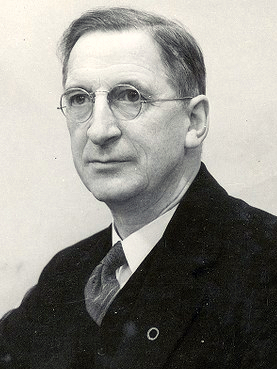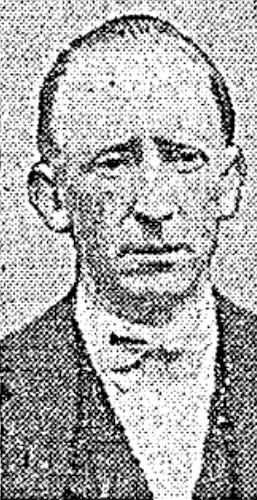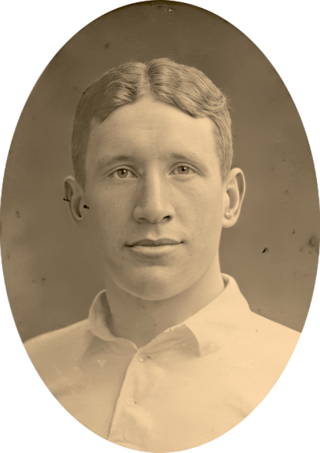
William Thomas Cosgrave was an Irish Fine Gael politician who served as the president of the Executive Council of the Irish Free State from 1922 to 1932, leader of the Opposition in both the Free State and Ireland from 1932 to 1944, leader of Fine Gael from 1934 to 1944, founder and leader of Fine Gael's predecessor, Cumann na nGaedheal, from 1923 to 1933, chairman of the Provisional Government from August 1922 to December 1922, the president of Dáil Éireann from September 1922 to December 1922, the minister for Finance from 1922 to 1923 and minister for Local Government from 1919 to 1922. He served as a Teachta Dála (TD) from 1921 to 1944. He was a member of parliament (MP) for the Kilkenny North constituency from 1918 to 1922.
Cumann na nGaedheal was a political party in the Irish Free State, which formed the government from 1923 to 1932. It was named after the original Cumann na nGaedheal organisation which merged with the Dungannon Clubs and the National Council to form Sinn Féin in 1905. In 1933 it merged with smaller groups to form the Fine Gael party.
The 3rd executive council of the Irish Free State was formed after the June 1927 general election to the 5th Dáil held on 9 June 1927. It was led by W. T. Cosgrave, leader of Cumann na nGaedheal, as President of the Executive Council, who had led the government since August 1922. It lasted 111 days.

The 1937 Irish general election to the 9th Dáil was held on Thursday, 1 July, following the dissolution of the 8th Dáil on 14 June by Ceann Comhairle Frank Fahy on the direction of the Executive Council. The general election took place in 34 parliamentary constituencies throughout the Irish Free State for 138 seats in Dáil Éireann. The number of seats in the Dáil was reduced by 15, from 153 to 138 seats, under the Electoral Act 1935.

The 1932 Irish general election to the 7th Dáil was held on Tuesday, 16 February, following the dissolution of the 6th Dáil on 29 January by Governor-General James McNeill on the advice of President of the Executive Council W. T. Cosgrave. The general election took place in 30 parliamentary constituencies throughout the Irish Free State for 153 seats in Dáil Éireann. It was the first election held in the Irish Free State since the Statute of Westminster 1931 removed almost all of the United Kingdom parliament to legislate for the Dominions, including the Irish Free State—effectively granting the Free State internationally recognised independence.

The June 1927 Irish general election was to elect the 5th Dáil held on Thursday, 9 June following the dissolution of the 4th Dáil on 23 May 1927. It was the first election contested by Fianna Fáil, which had been formed a year earlier when Éamon de Valera, leader of the abstentionist Anti-Treaty Sinn Féin, failed to convince the party to take their seats if and when the Oath of Allegiance were abolished. Most of Sinn Féin's TDs, as well as the bulk of its support, shifted to Fianna Fáil. The impact of this shift saw Sinn Féin all but decimated; it was reduced to five seats. This was for many years the end of the party as a major force in the southern part of the island; it would not win more than 10 seats at an election until 2011, by which time it had undergone fundamental transformation. This election cemented Fianna Fáil as a major party; it and Cumann na nGaedheal/Fine Gael remained the two largest parties in Ireland until 2020 when Sinn Féin came first in first preference votes.

Francis Patrick Fahy was an Irish Fianna Fáil politician who served as Ceann Comhairle of Dáil Éireann from 1932 to 1951. He served as a Teachta Dála (TD) from 1919 to his death in 1953.

Thomas Joseph O'Connell was an Irish Labour Party politician who served as Leader of the Labour Party from 1927 to 1932. He served as a Teachta Dála (TD) from 1922 to 1932. He was a Senator for the Cultural and Educational Panel from 1938 to 1944, 1948 to 1951 and 1954 to 1957.

Thomas Francis O'Higgins was an Irish Fine Gael politician and medical practitioner who served as Minister for Defence from 1948 to 1951, Minister for Industry and Commerce from March 1951 to June 1951 and Leader of the Opposition from January 1944 to June 1944. He served as a Teachta Dála (TD) from 1929 to 1932 and 1937 to 1953.

Clann Éireann, also known as the People's Party, was a minor republican political party in the Irish Free State. The party was founded on 25 January 1926 as a result of a split from the ruling Cumann na nGaedheal party, to protest against the Boundary Commission report, which permanently demarcated the border between the Free State and Northern Ireland. Clann Éireann was the leading representative of constitutional republicanism in Dáil Éireann until the success of Fianna Fáil at the June 1927 general election.

The National League was a political party in Ireland. It was founded in 1926 by William Redmond and Thomas O'Donnell in support of the Anglo-Irish Treaty, a close relationship with the United Kingdom, continued membership of the British Commonwealth and conservative fiscal policy.

Denis John Gorey was an Irish politician who served for nearly twenty years as Teachta Dála (TD), first as leader of the Farmers' Party, then for Cumann na nGaedheal, and finally for Fine Gael.
Séan Francis Gibbons was an Irish politician who sat as Cumann na nGaedheal Teachta Dála (TD) in the 1920s and as a Fianna Fáil TD in the 1930s. He later became a Senator, and was Cathaoirleach (chairperson) of the Seanad for five years.

John Jinks was an Irish politician who served in Dáil Éireann from June to August 1927.

The September 1927 Irish general election to the 6th Dáil was held on Thursday, 15 September, following the dissolution of the 5th Dáil on 25 August by Governor-General Tim Healy on the request of President of the Executive Council W. T. Cosgrave.

Michael Richard Heffernan was an Irish politician, sportsperson and soldier.
Comhairle na dTeachtaí was an Irish republican parliament established by opponents of the 1921 Anglo-Irish Treaty and the resulting Irish Free State, and viewed by republican legitimatists as a successor to the Second Dáil. Members were abstentionist from the Third Dáil established by the pro-Treaty faction. Just as the First Dáil established a parallel Irish Republic in opposition to the British Dublin Castle administration, so Comhairle na dTeachtaí attempted to establish a legitimatist government in opposition to the Provisional Government and Government of the Irish Free State established by the Third Dáil. This legitimatist government, called the Council of State, had Éamon de Valera as president. In 1926 de Valera resigned as president, left the Sinn Féin party and founded Fianna Fáil, which in 1927 entered the Fourth Dáil. Comhairle na dTeachtaí, never more than a symbolic body, was thereby rendered defunct.

Pádraic Ó Máille was an Irish politician. He was a founder member of Sinn Féin and of the Conradh na Gaeilge in Galway. He was a member of the Irish Volunteers from 1917 to 1921.

An election for 19 of the 60 seats in Seanad Éireann, the Senate of the Irish Free State, was held on 17 September 1925. The election was by single transferable vote, with the entire state being used in a single 19-seat contest.












